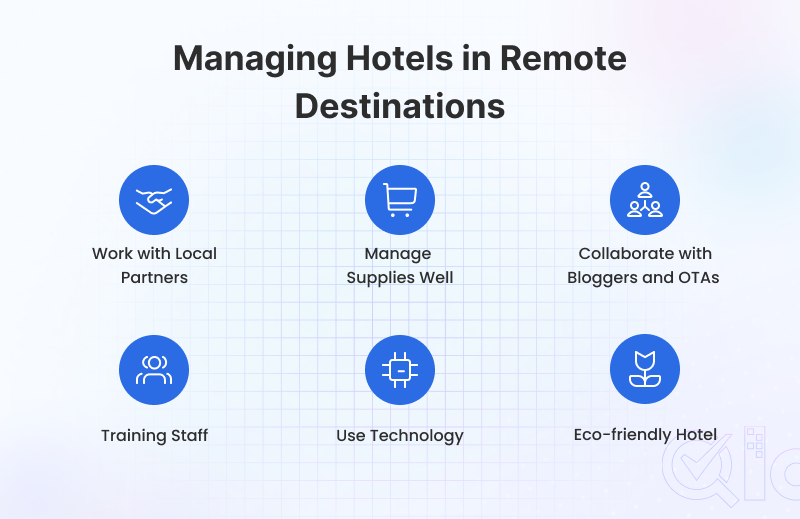Running a hotel is always a challenge. Managing one in a Remote Destination is even harder. But with the right steps, it can also be very rewarding.
This handbook will help you understand how to manage hotel operations in remote locations and create memorable experiences for your guests.
Why Remote Destination Hotels Matter
Remote hotels attract travelers who want peace, nature, and privacy. These hotels are special but need more planning to run well.
The key is simple: handle fewer resources smartly and still provide great service. That balance makes a hotel stand out.

Work With Local Partners
Strong local support is a big advantage. The community knows the culture and the area. They will help you oversee hotel operations.
Suppliers, farmers, and guides can be incredibly valuable. They ensure regular supplies and also give guests an authentic local touch.
- Hire staff from the local community
- Buy fresh goods from local markets.
- Partner with guides for tours and trips.
Plan Your Supplies Well
One of the biggest issues in a Remote Destination is supplies. If items don’t arrive on time, service quality may drop.
Hotels need to stock up in advance. A backup plan is also important to avoid delays that can upset guests.
- Store non-perishable food in bulk.
- Work with multiple suppliers.
- Use fresh local products whenever possible.
Train and Support Your Team
When you manage hotel operations far from cities, staff play many roles. They must be skilled, flexible, and ready for challenges.
Hiring in remote areas is not easy. Training staff to handle problems on their own keeps the service smooth at all times.
Create a Great Guest Experience
Guests visiting a Remote Destination want something different. They want the beauty of nature along with comfort.
Add simple activities like village walks, cultural nights, or yoga sessions. These little touches really make the stay feel more special.
Use Technology to Stay Connected
Even in remote places, technology can make hotel management easier. It saves time and reduces pressure on staff.
Online booking tools, cloud systems, and digital payments make things smoother for both hotels and guests.
- Use cloud property management systems
- Allow online or contactless check-in.
- Accept digital payments easily.
Manage Energy and Water
Remote areas may face power and water shortages. Hotels must use smart and eco-friendly systems to solve this issue.
Solar panels, rainwater storage, and energy-saving lights reduce costs and protect the environment.
Market Your Hotel Effectively
Your potential guests need to know why they should come to your hotel! You need to showcase the beauty of the Remote Destination and the unique stay.
Utilize social media to share your stories, images, and videos. Work with travel bloggers and Online Travel Agencies to reach more travelers.
Always Be Ready for Emergencies
Being far from a city means you must prepare for emergencies. Safety makes guests feel secure and cared for.
Keep first-aid kits ready, train staff in basic care, and connect with the nearest hospital for urgent help.
Go Green for Long-Term Success
Eco-friendly hotels are popular among modern travelers. Guests want to stay where nature is respected.
Use less plastic, recycle waste, and run green programs. Guests enjoy being part of these efforts, too.
Conclusion: Challenges Can Be Strengths
To manage hotel operations in a Remote Destination, you need smart planning and strong teamwork. Challenges can turn into unique features.
It is possible through attitude, local resources, and technology to leverage remote locations to achieve memorable experiences and establish a sustainable future.
Contact QloApps!
Thanks for reading my article on How to Manage a Hotel in Remote Destinations.
If you are looking for software to manage your hotel operations, try QloApps – Hotel Management Software.
Learn more about QloApps from the reservation system guide. Kindly raise a ticket for technical assistance and share your thoughts with us on QloApps Forums.
Be the first to comment.